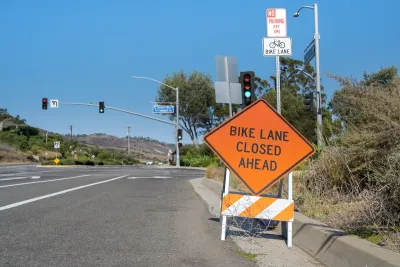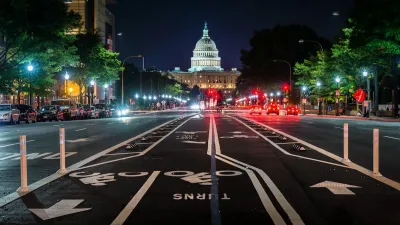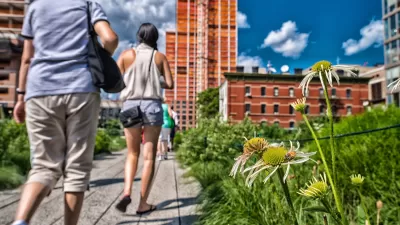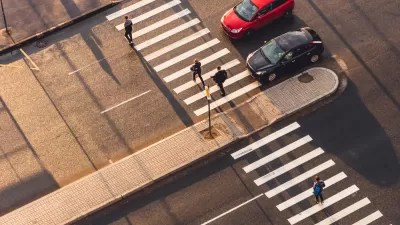A new department memo requires a review of projects with the goal of removing bike, pedestrian, and electric vehicle infrastructure.

The Department of Transportation (USDOT) will require “the removal of all elements of projects related to bike infrastructure, charging infrastructure, climate change or those that take equity into account competitive grant funding,” according to a leaked policy memo that follows a memo rescinding environmental and equity considerations.
According to an explainer from Transportation for America, the memo applies to projects whose funding has not yet been fully obligated. “Projects that contain ‘flagged activities’ could be revised, even if they meet all requirements of law, to comply with this administration’s agenda.” One program that could lose significant amounts of funding under the memo is Safe Streets and Roads for All; just $515 million of the $2.9 billion awarded under the program has been obligated to date.
The action is unusual in that new administrations generally shift priorities for new projects rather than undoing projects already underway. T4A warns that “If this becomes precedent, future presidents could make unilateral decisions to freeze funding for any project that does not align with their own priorities. Allowing the pendulum to swing back and forth every four years undermines the rationale of the supposedly stable highway trust fund—perhaps further evidence that the model is no longer sustainable.”
FULL STORY: USDOT’s new memo requires a review of competitive grant awards

Study: Maui’s Plan to Convert Vacation Rentals to Long-Term Housing Could Cause Nearly $1 Billion Economic Loss
The plan would reduce visitor accommodation by 25,% resulting in 1,900 jobs lost.

North Texas Transit Leaders Tout Benefits of TOD for Growing Region
At a summit focused on transit-oriented development, policymakers discussed how North Texas’ expanded light rail system can serve as a tool for economic growth.

Why Should We Subsidize Public Transportation?
Many public transit agencies face financial stress due to rising costs, declining fare revenue, and declining subsidies. Transit advocates must provide a strong business case for increasing public transit funding.

How to Make US Trains Faster
Changes to boarding platforms and a switch to electric trains could improve U.S. passenger rail service without the added cost of high-speed rail.

Columbia’s Revitalized ‘Loop’ Is a Hub for Local Entrepreneurs
A focus on small businesses is helping a commercial corridor in Columbia, Missouri thrive.

Invasive Insect Threatens Minnesota’s Ash Forests
The Emerald Ash Borer is a rapidly spreading invasive pest threatening Minnesota’s ash trees, and homeowners are encouraged to plant diverse replacement species, avoid moving ash firewood, and monitor for signs of infestation.
Urban Design for Planners 1: Software Tools
This six-course series explores essential urban design concepts using open source software and equips planners with the tools they need to participate fully in the urban design process.
Planning for Universal Design
Learn the tools for implementing Universal Design in planning regulations.
City of Santa Clarita
Ascent Environmental
Institute for Housing and Urban Development Studies (IHS)
City of Grandview
Harvard GSD Executive Education
Toledo-Lucas County Plan Commissions
Salt Lake City
NYU Wagner Graduate School of Public Service





























